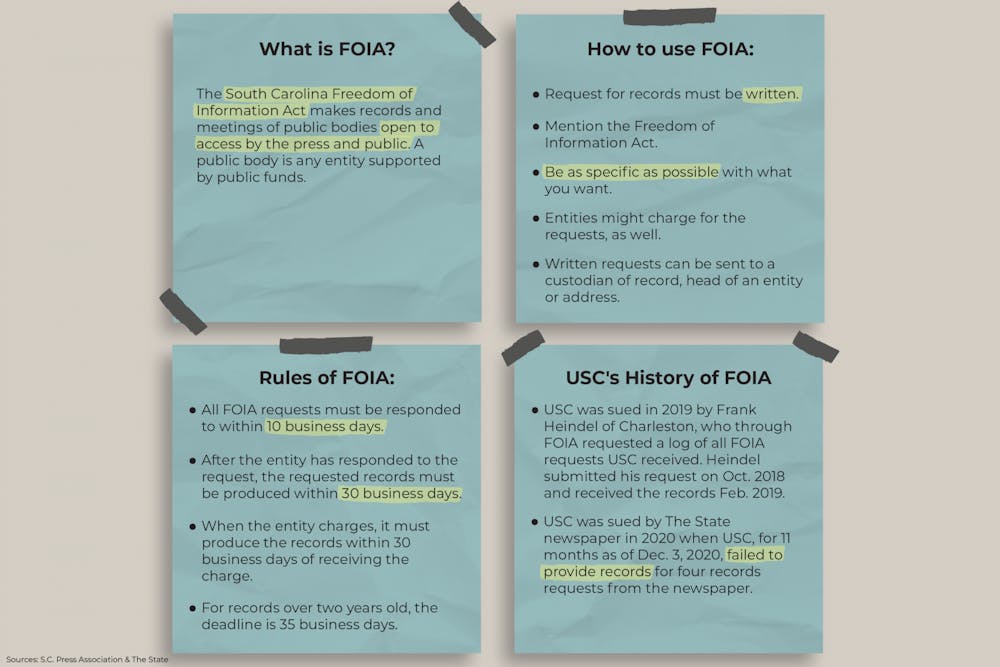In an effort to comply with the South Carolina Freedom of Information Act (FOIA) more efficiently, the University of South Carolina hired a new FOIA coordinator and is working to develop an online portal to submit FOIA requests through.
The drive to improve USC’s ability to handle FOIA requests came after two lawsuits were filed against the university in 2019 by Frank Heindel and 2020 by The State newspaper. The lawsuits said USC did not provide public records within the legal time frame required by the South Carolina FOIA. University spokesperson Jeff Stensland said the university recognized it needed to improve.
"A big part of the reason why we made it a priority to hire the FOIA coordinator, to make an investment in the software, is that we realized that we need to be — we need to be better; we need to do better," Stensland said.

Heindel dropped his suit after USC promised to improve the process for tracking FOIA requests. The State also dropped its suit after receiving the information it had previously requested, according to Stensland.
“The reality is, is that when FOIA’s come in, the information is often housed in multiple areas around the university, and so it’s not as if it’s always easily accessible,” Stensland said. “With COVID, we’ve had lots of other things going on here at the university. It’s certainly not an excuse, but hopefully it helps explain how this stuff can kind of work in real time."
According to Stensland, following Heindel's suit in 2019 the university starting keeping track of FOIA requests through spreadsheets. This January, USC hired Shannon Beaudry to be the school's first FOIA coordinator.
As FOIA coordinator, Beaudry's job entails finding documents or information requested and ensuring requests are responded to and fulfilled within the legal time frame allotted by South Carolina FOIA. She is also responsible for redactions and removing information that is legally protected before turning over documents to a requester.
Beaudry is in charge of overseeing every FOIA request that comes to USC and works with departments at the school to obtain the records requested. All departments at USC are in charge of maintaining their own records, according to Stensland.
"This is someone who works with departments and divisions around the university and is responsible for making sure that all FOIA requests that we receive are handled in a timely and consistent manner," Stensland said.
The Daily Gamecock reached out to Shannon Beaudrey on March 25 via phone and email for comment. USC Public Relations Strategist Dana Woodward said Beaudrey was unavailable for comment before March 28.
Prior to Beaudry's hire, there was no central person whose primary responsibility was handling FOIA requests. In the past, requests were handled on a department by department basis depending on what type of record was being requested.
Having a central person to handle FOIA requests and the implementation of a digital portal to submit them puts USC more in line with some of its peer schools.
FOIA laws vary from state to state. Christine Wilda, associate chancellor for compliance for the University of Massachusetts Amherst, said her university made the switch to using an online portal to satisfy Massachusetts FOIA laws a few years ago.
"We set up that portal because in the legislation that the commonwealth passed it required us to do annual reporting to the commonwealth about all of our requests, so that's why we implemented this more technical solution to get a handle on all of it," Wilda said.
The South Carolina FOIA requires that all public agencies must respond to FOIA requests within 10 business days and have 30 business days following the response to provide the records requested. If a record is older than two years, according to South Carolina FOIA, a public agency has 20 business days to respond to the request and 35 business days following the response to provide the information.
Paula Barrett, custodian of records for the University of Missouri, said according to Missouri FOIA laws, she has three days to respond to and grant a request, if possible. Otherwise, she has to work with the requester to negotiate to provide the information within a reasonable time frame.
"If I can't, and it's going to take longer, then I have to respond within that three days to let them know we're working on it and give them an estimate of when I anticipate we'll be able to get those," Barrett said.
Stensland said USC should have its new online database and portal up in approximately a month. Until then, the best way to make a public records request is to email Shannon Beaudry at beaudrys@mailbox.sc.edu.

